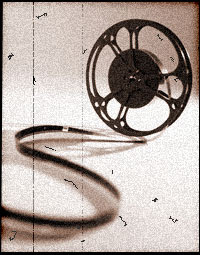
I'm a little late in getting around to posting this, but I did attend the 73rd annual New York Film Critics Circle awards at Spotlight in Times Square Jan 6., which was much fun but slightly surreal. Kyle Smith of the New York Post wrote a snarky, but fairly dead-on, synopsis of the night.
Other quick impressions:
- I've always admired Sarah Polley's aloof, slightly otherworldly screen presence - she'd be great in a remake of Park Chan-wook's LADY VENGEANCE. But in person (I physically bumped into her at one point as she was racing across the floor to see someone) she's actually very young, cheerful and girly.
- Daniel Day-Lewis and Javier Bardem are both tall, and appear to have the same chin.
- Steve Buscemi gave the speech of the night, presenting the Coen Bros with their best director award. It was drink-spilling funny, though the Bros. - or at least Joel - seemed vaguely irritated through most of the evening.
- Ellen Barkin's dress was ... well, have a look yourself.
- Patricia Clarkson, whom I've loved from afar ever since I saw her in THE DEAD POOL, looked terrific and radiated such an aura of general niceness that she fairly glowed.
- In the Embarassing Moment Department, I approached and struck up a conversation with director Michael Almereyda, certain that I knew him from somewhere else. However, not only was I unable to establish where that might have been, but as he ran through his very substantial list of credits, I realized I hadn't seen any of his films. I *had* seen a great episode of DEADWOOD he directed, but by the time we got to that point, the conversation was in the last throes of a slow, painful death. Sorry about that, Michael.
The irony is, that particular episode contains the quintessential DEADWOOD speech, courtesy of Al Swearengen, which I can reel off the top of my head whenever my DW fan credentials are questioned:
"Pain or damage don’t end the world. Or despair or fucking beatings. The world ends when you’re dead. Until then, you got more punishment in store. Stand it like a man… and give some back.”
That night, thankfully, I kept it to myself.






